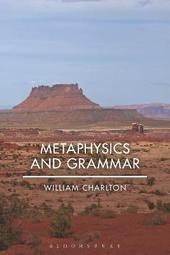
|
Metaphysics and Grammar
Paperback / softback
Main Details
| Title |
Metaphysics and Grammar
|
| Authors and Contributors |
By (author) William Charlton
|
| Physical Properties |
| Format:Paperback / softback | | Pages:240 | | Dimensions(mm): Height 234,Width 156 |
|
| Category/Genre | Philosophy - metaphysics and ontology |
|---|
| ISBN/Barcode |
9781472579300
|
| Classifications | Dewey:110 |
|---|
| Audience | | General | | Professional & Vocational | |
|---|
|
Publishing Details |
| Publisher |
Bloomsbury Publishing PLC
|
| Imprint |
Bloomsbury Academic
|
| Publication Date |
13 March 2014 |
| Publication Country |
United Kingdom
|
Description
Metaphysics deals with truth, existence and goodness; it also considers change, time and causation, which characterise the physical world, and thought and language. We are familiar with all these things, but when we try to say what they are we become tongue-tied. William Charlton draws a line between lexicography, which lists words, and grammar, which specifies constructions for various forms of speech. Both words and constructions have meaning, but in different ways, and he argues that the topics of metaphysics are expressed primarily by constructions. He surveys the history of philosophy from classical Greece to the present day, he shows how metaphysics and grammar grew up in tandem, and he connects the difficulties philosophers have encountered, especially since the Enlightenment, with a failure to grasp the significance for metaphysics of grammar as distinct from lexicography. Metaphysics and Grammar presents metaphysics as an art, not a science. It takes the traditional topics in turn; it brings out the relation between each of them and a form of speech; and it argues that these forms of speech provide us with our only reliable access to our nature as conscious beings acting in a physical world.
Author Biography
William Charlton was Head of the Philosophy Department at Edinburgh University, UK. He has taught Humanity at Glasgow University and Philosophy at Trinity College, Dublin, Ireland. He is now retired.
ReviewsWilliam Charlton's thesis that to understand the topics of metaphysics is to understand the grammar of our language sets him radically at odds with most contemporary metaphysics and most contemporary philosophy of language. The interest of his incisive and instructive book lies in the detail of his arguments. This is a book to be reckoned with. * Alasdair MacIntyre, Professor of Philosophy Emeritus, University of Notre Dame, USA * I find it fascinating and full of insights . . . this book is always provocative, insightful, and original. * Martha Nussbaum, Department of Philosophy and Law School, University of Chicago, USA * Wonderfully clear and engaging, Charlton's book is the first fully to expound the idea that problems of metaphysics are to be tackled through an understanding of grammatical constructions. Charlton discusses and also goes beyond predecessors such as Wittgenstein, by showing the importance of focussing on a precise notion of grammar, while he also engages with the thought of many living as well as ancient philosophers. Stimulating arguments and a pleasure to read. * Alexander Bird, Professor of Philosophy, University of Bristol, UK * Firmly rejecting current philosophical orthodoxy, with its science-inspired conception of 'research', Charlton's lucid and carefully argued study makes a strong case for thinking the traditional problems of metaphysics are best handled by developing a proper understanding of how language works. * John Cottingham, Professorial Research Fellow, Heythrop College, University of London, UK and Professor Emeritus of Philosophy, University of Reading, UK * Charlton's scholarship is wide-ranging and eclectic, and his choice of examples is sometimes entertaining and surprising. His approach would be refreshing mainly for those already jaded by the excesses of contemporary analytic metaphysics. Summing Up: Recommended. Graduate students and researchers/faculty. -- S. P. Schwartz, Ithaca College * CHOICE * This lively and elegantly written book makes important suggestions on how to think about fundamental questions in metaphysics. It is not overly technical, so can be tackled by the interested amateur, but at the same time offers provocative thoughts, from which the professional philosopher could benefit. * Jane Heal, Emeritus Professor of Philosophy, University of Cambridge, UK * William Charlton's study of Metaphysics and Grammar is an original and provoking philosophical enquiry. Written in the clearest of styles, it gently attracts the reader to follow its argument as it successively examines the concepts that have been at the centre of metaphysical reflection during the last two millennia: truth, goodness, existence, change, time, and causation. The book's central thesis is that these most abstract and fundamental concepts are properly understood as corresponding to grammatical constructions of natural language. Although deeply rooted in the history of philosophy (of which Charlton is a peerless expert), the book is eminently philosophical and engages in debates with the most authoritative contemporary philosophers. * Paolo Crivelli, Associate Professor of Ancient Philosophy, University of Geneva, Switzerland * This is a book of rare originality, significance and philosophic power ... It is a book for connoisseurs of philosophy, but written with such lucidity and humour that others too will find themselves absorbed it is also a book for lovers of languages. * Heythrop Journal *
|